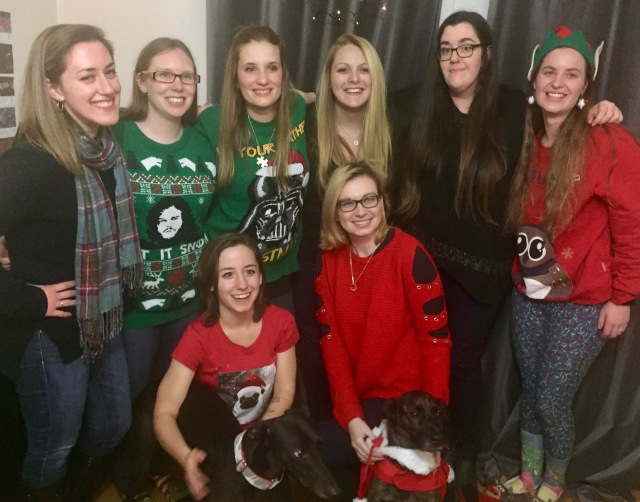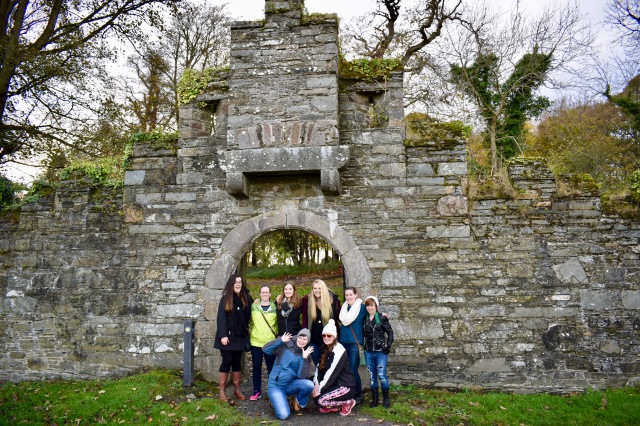I’ve been very excited to receive so many e-mails and messages from prospective and incoming students in the past year. I’m thrilled to hear that this blog is succeeding in one of its main goals: helping and informing others about vet school and about living abroad in Ireland. I wanted to compile a list of questions I have been asked as they may help others.

General questions about moving to Ireland:
Q: What made you decide to move to Ireland and attend UCD?
On a pragmatic level, attending school in Ireland was going to end up being about the same price as going to certain schools in the US – and even cheaper than some. Yes, that includes the associated costs like plane tickets, a car, general living costs, things like that.
On a personal level, I’ve always wanted to experience living (and studying) in a different country and Ireland was at the top of my list for countries to visit.
 On a much more personal level, and a level I don’t usually go into when asked in person, 2015 was a rough year for both myself and my fiancé. We experienced an armed carjacking and, two months later, an apartment fire that destroyed everything we owned. I felt like I needed to hit a sort of reset button in my life and get a fresh start, and what better way to do it than moving across the world and starting a new degree? I do want to make it clear, though, that this recovery and huge move were only possible because of the amazing support system that I have back in the U.S.
On a much more personal level, and a level I don’t usually go into when asked in person, 2015 was a rough year for both myself and my fiancé. We experienced an armed carjacking and, two months later, an apartment fire that destroyed everything we owned. I felt like I needed to hit a sort of reset button in my life and get a fresh start, and what better way to do it than moving across the world and starting a new degree? I do want to make it clear, though, that this recovery and huge move were only possible because of the amazing support system that I have back in the U.S.
Q: How did you find a place to live?
Finding accommodation was easily one of the toughest parts of the move. Dublin is experiencing a bit of a housing crisis at the moment – prices are high, supply is low and UCD is on the edge of one of the nicer parts of County Dublin. I spent months searching in advance, not realizing that it isn’t the most effective way to do it. Once a property comes up as available (the typical site to find these kinds of things is Daft.ie, for those of you looking), it doesn’t stay up long. To make matters worse, landlords usually want an in-person meeting prior to signing – and believe me, that is completely understandable. Recently, UCD has even had to put out warnings about possible housing scams in the Dublin area. You need to be very careful and vigilant when looking.
The way I DID eventually manage to find a place was to post my own tenant ad on Daft.ie, which is something I would recommend to anybody who is in need of housing. I received multiple responses, including the one that we ended up taking (we are still living here now!).
It should be noted that our situation was complicated by the fact that there were two of us and a dog; we were very lucky to find a landlord that was alright with that. We live outside of the city, which means a bit of a commute, but our dog has a huge yard to run in and everything else he needs. Our rent is also quite a bit lower than what you typically see around UCD.
So just be aware – if you plan on moving with a pet and/or a partner, accommodation can be tricky to find (especially close to campus). I would say that getting a car and dealing with a longer commute has been absolutely worth it for us.
Q: How did you bring your dog to Ireland?
We used Pet Express, a service which helps you transport your pet safely and conveniently. (No, I’m not getting paid to say this.) It came at a cost, but it was worth it to us.
Q: How did your fiancé come with you to Ireland?
Kelsey is actually also studying at UCD (computer science). If that isn’t your case, it’s important to note that it is very difficult to bring your partner with you. If they don’t have a good reason to stay, such as being a student or having a job, they must leave within 90 days. It also isn’t very easy to find work.
Q: When should I arrive in Ireland before term starts?
This is a tricky question depending on your situation, but most people have to come at least a few weeks to a month early in order to find accommodation. You will also need time to set up your bank account, cell phone, figure out transportation, what you need for school and home – and, more importantly in this situation, where to get it.
Q: What is public transportation like around Dublin?
Luckily there are many choices for public transport around UCD and City Centre. Dublin Bus, the Luas, and commuter trains are all popular options. As a student, you can get a Student Leap Card which allows you to get discounted public transit. You can easily top up your card and it also gets you some nifty discounts at certain stores, movie theatres, and restaurants.
Q: What stores and banks are common? What do you use?
Banks:
We use AIB, which has great offers for student accounts. They also have a location on campus which makes them a very convenient choice. Bank of Ireland caters to students as well. There are other banks, but these are the two that were recommended to us as students and we couldn’t be happier with AIB.
Grocery stores:
For groceries, we shop at SuperValu and Tesco. Dunnes, Aldi and Lidl are other common options that just aren’t as close to us. SuperValu and Tesco both offer delivery and often have free delivery deals – which can be great when you’re finding yourself too busy studying to shop.
Clothing:
Penney’s and Dunnes are sort of Target-level clothing. TK Maxx is just like TJ Maxx in the states. There is a mall near campus and available by public transit (Dundrum Shopping Centre) that has plenty of choices popular among students. Schuh is one of the main shoe stores, and even has a student discount with your student card.
Home Goods:
We live close to an IKEA, which is great for affordable furniture, kitchen items and decor. The school even offers occasional bus trips there for students at the beginning of the semester. Penney’s is a good place to buy linens, towels and bedding.
Pharmacies (chemists, as they’re called here):
Boots and Stacks are the two biggest and most popular chemists in our experience. I usually prefer Boots as it has most of the major brands of makeup, hair products and toiletries that I used back home. They also have student discounts with your Leap Card!
Q: What are cell phone plans like in Ireland and what company do you use?
Cheaper than the US! We have a “Top Up” (pay as you go) plan with 3, one of the major carriers in Ireland. We pay 20 Euro a month for unlimited data and unlimited talk and text to other 3 customers within Ireland. To communicate, though, seemingly everyone here either uses WhatsApp or Facebook messenger so the talk and text don’t get used much. The cool thing about this plan is that the 20 Euro is actually then able to go  towards other things. You top up with it, but it then counts as credit for things like international calls, calls to other carriers, and even paid parking around County Dublin. Other major carriers used by some of my friends are Vodafone and Tesco Mobile.
towards other things. You top up with it, but it then counts as credit for things like international calls, calls to other carriers, and even paid parking around County Dublin. Other major carriers used by some of my friends are Vodafone and Tesco Mobile.
As of 2017, you can use your plan anywhere in the EU as though you’re at home, which is great for students who want to travel while they’re here!
Q: What are GNIB appointments?
GNIB stands for the Garda (Irish police) National Immigration Bureau. All students have to schedule a GNIB appointment once a year to renew their GNIB card, which they need to stay in Ireland (think student visa). It’s a bit of a long and painful process: not just attending the appointment, but even booking it. You must book WELL in advance – the window you can check is 3 months and there’s typically literally nothing available. In fact: mine expires on the 31st of October, and I’ve been checking every day this week (It is now the 5th of August) and haven’t been able to find an appointment yet. UCD is good about providing a list of documents you need to bring to the appointment – do NOT forget any of these documents! You will also need to pay 300 Euro each time, only payable by card. If you have any questions about the documents needed or the process, please feel free to contact me – I know it can be confusing.
Q: How did you go about getting a car and driving in Ireland?
Due to where we live, a car was an absolute necessity. Finding a car with automatic transmission wasn’t as hard as we thought it would be, and it was very affordable (it was ten years old – now 12!). Driving on the left isn’t as scary as you might think – we got used to it very quickly (even with all the multi-lane roundabouts).
By far the hardest part of driving here is getting insurance. It’s expensive and not many companies want to insure older cars or foreigners. They also expect a minimum of five years with no claims – even if that claim has nothing to do with your driving. In my case, I’ve never been in an accident or even gotten a ticket in my 11 years of driving – but was denied coverage because of the carjacking I mentioned earlier. So because somebody stole my car at gunpoint, I’m not allowed to drive in Ireland. Luckily Kelsey was able to get insured – but unfortunately that means he has to do all the driving.
In addition to insurance, car owners in Ireland have to pay an annual road tax and have a sort of combination automobile evaluation and emissions test known as an NCT.

UCD and veterinary school questions:
Q: What books do you recommend the most for first year?
Some of the main books I recommend are:
Anatomy: Anatomy of Domestic Animals: Systemic & Regional Approach by Pasquini OR Textbook of Veterinary Anatomy by Dyce (both are good but you probably only need one – check them out and see which one you prefer!). I also highly recommend Guide to the Dissection of the Dog by Evans and The Veterinary Anatomy Coloring Book from Saunders.
Physiology: Cunningham’s Textbook of Veterinary Physiology
Just a note – previous students often sell their books cheaper than you could buy them anywhere else so be sure to check the bulletin boards in the vet building!
Q: What is pre-clinical EMS?
Pre-clinical extramural studies or EMS is animal handling experience that the school requires you to organize and obtain on your breaks. This is to make sure that you are competent and safe around different types of animals (companion animals, horses, sheep, dairy cows, beef cattle, and pigs). You will receive more information about the specific requirements at orientation. Your EMS must be completed before your handling exams at the end of your second year.
Q: What is CEMS?
CEMS is your clinical extramural studies. This is similar to EMS in that it has to be set up by you on your breaks but these placements are for clinical experience instead of just handling experience. Requirements for CEMS are presented in second year.
Q: What societies should I join on campus?
That’s totally up to you! There are some awesome societies on campus and you don’t have to just join veterinary ones. I like OneHealth and Vet Society personally but there are also sports societies, gaming societies, history societies, language societies, Harry Potter societies – you name it! One of the first few weeks of classes is ‘Freshers Week’ and during that week there will be a large tent where all the societies set up booths. You can browse through and talk to them there and decide what you are interested in joining!
Q: What is orientation week like?
Your orientation week schedule is fairly packed. This is important to note as that means you probably won’t have time to set up your bank account or cell phone and you also probably won’t have time to go to shops for things you may still need before classes start the following week. This is one of the main reasons I suggest that students arrive at least a few weeks in advance so that they can get settled in appropriately.

Orientation week for the graduate entry vet students consists of multiple long days at the UCD Lyons teaching farm. You will be taken to a shop where you can buy wellies (rain-boots) and coveralls prior to your first day on the farm so don’t worry if you don’t own any already or don’t want to pack yours to bring to Ireland. Also, make sure you pack a lunch for those long days on the farm!
These are just some of the main questions I have been asked. If you have any other questions or would like clarification on something I’ve mentioned, please feel free to contact me!




 that had been in the farmer’s family for over three hundred years. That was a pretty crazy thought – this farm had been in operation by his family longer than the United States had been a country. It wasn’t just the age, either: his farm and its views are so beautiful that they have been featured in commercials and movies, and are a frequent stop for European tour groups. While I was there, in fact, a French tour group came through the farm to learn about the history of the area and the Irish sheep farming business. Beyond what everyone else was able to see, I had the privilege of getting a few private tours during my time there from the farmer himself, who of course was very knowledgable about the surrounding farms and countryside (including Glendalough and the area around it, Sugarloaf Mountain, and the Powerscourt Waterfall). The work was hard but rewarding and the days were long and full of activity, but looking back on it I had a fantastic time and learned a lot.
that had been in the farmer’s family for over three hundred years. That was a pretty crazy thought – this farm had been in operation by his family longer than the United States had been a country. It wasn’t just the age, either: his farm and its views are so beautiful that they have been featured in commercials and movies, and are a frequent stop for European tour groups. While I was there, in fact, a French tour group came through the farm to learn about the history of the area and the Irish sheep farming business. Beyond what everyone else was able to see, I had the privilege of getting a few private tours during my time there from the farmer himself, who of course was very knowledgable about the surrounding farms and countryside (including Glendalough and the area around it, Sugarloaf Mountain, and the Powerscourt Waterfall). The work was hard but rewarding and the days were long and full of activity, but looking back on it I had a fantastic time and learned a lot.





 called Roundwood, but was up in the mountains – again with stunning views. This farm was unique in that it had: two different breeds of sheep, beef cattle, horses, and some quail and chickens. The family was unbelievably welcoming and helpful, and went above and beyond to teach us. We had the opportunity to inject and dose lambs and sheep, lunge and care for horses, and evaluate beef cattle. We had such a great time with them that we were considering coming back to help them during lambing season this year.
called Roundwood, but was up in the mountains – again with stunning views. This farm was unique in that it had: two different breeds of sheep, beef cattle, horses, and some quail and chickens. The family was unbelievably welcoming and helpful, and went above and beyond to teach us. We had the opportunity to inject and dose lambs and sheep, lunge and care for horses, and evaluate beef cattle. We had such a great time with them that we were considering coming back to help them during lambing season this year.





 and surrounding area. This was especially beautiful in the early morning – we got to see the city lit up in the dark, the sunrise over the bay, a blanket of fog covering it all, and the mountains in a heavy snow. In addition to the typical tasks like milking, feeding, and bedding, we were lucky enough to have some special experiences while we were there. We got to administer vaccinations, watch artificial insemination and ultrasounds, and attend a market and auction for dairy cows and calves. As an added bonus, we were lucky enough to be there while their sheep dog had a litter of puppies! It was another amazing and helpful family – and a farm labourer that was always willing to answer questions, demonstrate techniques, and give advice. The farmer also invited us back to help with calving in the spring, which my friend and I are both looking forward to.
and surrounding area. This was especially beautiful in the early morning – we got to see the city lit up in the dark, the sunrise over the bay, a blanket of fog covering it all, and the mountains in a heavy snow. In addition to the typical tasks like milking, feeding, and bedding, we were lucky enough to have some special experiences while we were there. We got to administer vaccinations, watch artificial insemination and ultrasounds, and attend a market and auction for dairy cows and calves. As an added bonus, we were lucky enough to be there while their sheep dog had a litter of puppies! It was another amazing and helpful family – and a farm labourer that was always willing to answer questions, demonstrate techniques, and give advice. The farmer also invited us back to help with calving in the spring, which my friend and I are both looking forward to.
























































